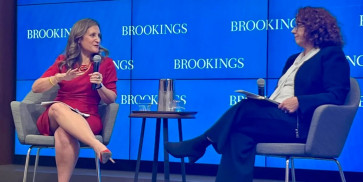Popular Reads
Top Results
Can't find what you're looking for?
View all search resultsPopular Reads
Top Results
Can't find what you're looking for?
View all search resultsThe 'Freeland doctrine' and its implications for the Asia-Pacific
A major flaw in Chrystia Freeland's world view is that it equates "liberal democracy" with Western nations and fails to recognize the democratic achievements of the "in between" nations like Indonesia and other ASEAN states.
Change text size
Gift Premium Articles
to Anyone
 Canadian Deputy Prime Minister and Finance Minister Chrystia Freeland (left) speaks as Brookings Institute vice president and foreign policy director Suzanne Maloney looks on during a talk hosted on Oct. 11, 2022 at the research group’s headquarters in Washington, DC. (Twitter account of/Chrystia Freeland)
Canadian Deputy Prime Minister and Finance Minister Chrystia Freeland (left) speaks as Brookings Institute vice president and foreign policy director Suzanne Maloney looks on during a talk hosted on Oct. 11, 2022 at the research group’s headquarters in Washington, DC. (Twitter account of/Chrystia Freeland)
I
t might be called a framework for the future of geopolitical relationships, and it is an approach that has much potential though the details still need to be figured out as regards its implications and possible ways of implementation.
I am referring to the speech that Canadian Deputy Prime Minister and Finance Minister Chrystia Freeland delivered on Oct. 11 at the Brookings Institution in Washington, DC. In it, she posited a possible blueprint on how democracies should deal with the new era of geopolitical tensions and conflicts.
Freeland said that the previous era, which started on Nov. 9, 1989 with the collapse of the Berlin Wall and the communist regimes in Eastern Europe, followed by the collapse of the Soviet Union, was now over.
The “flat world” theory of author and journalist Tom Friedman was not successful, Freeland explained, as the world had opened up and the “end of history” definitely did not happen.
In her speech, Freeland pressed the idea that liberal democracies should enhance their relationships, primarily through trade and interconnected and interdependent supply chains among themselves.
This could be called geopolitical reliance or, as Freeland quoted United States Treasury Secretary Janet Yellen, “friend-shoring”, in which “democracies must make a conscious effort to build our supply chains through each other’s economies”.
Yet, the first pillar of this blueprint won’t work with just better economic relationships among the Group of Seven plus Australia, New Zealand and South Korea. Such a strategy would have to bring real and practical benefits to the people of these nations, and not just the default outcomes of new trade agreements.


















